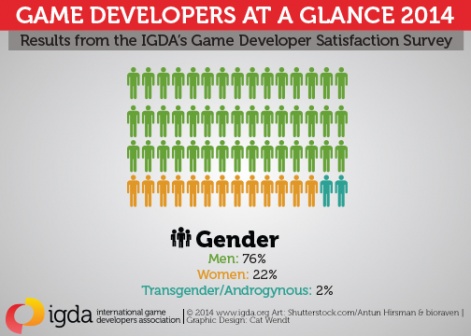Almost a quarter of people working in the games industry are women, according to a new study published by thw Independent Game Developers Association (IDGA), with gender diversity in the workforce on the up despite continued claims that many games themselves remain sexist.
The IDGA claims the new study demonstrates an almost doubling of the figures from five years ago, when women accounted for 11.5 per cent of the industry.
It's also the first time that figures have been collected on workers identifying as transgender or "other," at two per cent of respondents.
Gender bias in games
"The IGDA plans to use the results to better understand its members’ priorities and the most critical issues affecting their overall satisfaction," says report author and IDGA executive director Kate Edwards, "and in turn use that information to help prioritize the association’s advocacy efforts and initiatives."
The results of the survey arrive in the wake of an industry-wide outcry about systemic sexism within the games industry, when Ubisoft faced accusations of perpetuating women's unbalanced role in games by removing playable female characters from the upcoming and ironically titled Assassin's Creed Unity.

Although Ubisoft puts this down to a matter of practicality over discrimination - two sets of animations, doubling the number of voiceover recordings - it does seem to be indicative of the industry's current opinion of the role women play both in creating games, and in female character themes.
Sociology major Jennifer Allaway echod similar sentiments at this year's GDC during her talk on Sexism and the Game Industry: An Empirical Study, in which she highlighted a distinct gender bias within the industry, but also saw signs of a changing culture.
"Not all the numbers I found were grim," she explains. "The dialogue of the past few years has been working, despite the harshness of the [study's data]. There is still much progress to be had, and it won’t end for a long time to come, but it is on the rise as this dialogue grows around us."






















